Politics
Erdoğan marks 106th anniversary of Erzurum Congress
President Recep Tayyip Erdoğan commemorated the 106th anniversary of the historic Erzurum Congress on Wednesday, emphasizing its lasting impact on Türkiye’s unity and national identity.
In a statement released by the Presidency’s Directorate of Communications, Erdoğan described the 1919 Congress as a turning point in the nation’s path to independence.
“The consciousness, determination and resolve that emerged at the Congress remain the foundation of our unity and solidarity today,” he said, calling it a symbol of love for the homeland and a key force in advancing toward the “Century of Türkiye.”
Erdoğan noted that the Erzurum Congress, although initially planned as a regional gathering, became a national platform that affirmed the will of the people and laid the groundwork for the Republic. Recalling the Congress’s firm rejection of mandates and protectorates, he reaffirmed Türkiye’s enduring commitment to national sovereignty.
“On this meaningful anniversary,” Erdoğan added, “I remember all the heroes of our independence struggle, especially Veteran Mustafa Kemal Atatürk, with respect and gratitude and salute all my citizens with heartfelt feelings.”
Held from July 23 to Aug. 4, 1919, the Erzurum Congress marked a turning point in the Turkish national resistance following World War I and the Allied occupation of Ottoman territory.
Convened in response to growing foreign threats – especially the Greek occupation of western Izmir – the Congress united delegates from six eastern provinces to affirm Türkiye’s territorial integrity and reject mandates or foreign rule.
Led by Mustafa Kemal, the assembly laid the ideological foundation for the Turkish War of Independence and produced key principles later adopted nationally.
As the first organized response to foreign intervention, it helped define the modern Turkish national identity and set the stage for the founding of the republic.
Politics
MIT Academy report warns of expanding Daesh presence in Africa
The Daesh terrorist organization’s shift in strategic focus to Africa following its territorial losses in Iraq and Syria brings about new threats, the National Intelligence Academy (MIA) said on Tuesday in a report, warning that the group now exploits weak state structures, socioeconomic inequality and security gaps to expand its reach.
It published a comprehensive report titled “Daesh in Africa: Local and Regional Dynamics,” examining the growing influence of the terrorist group across the continent.
According to MIA, Daesh has adopted a “wilayat” (province-based) decentralization strategy in Africa, establishing localized branches from Libya to the Sahel, Central Africa and Mozambique. These new structures not only pose security threats but also carry significant political, social and environmental implications.
The report emphasizes that radicalization in Africa is not solely ideological but is driven by ethnic tensions, youth unemployment, structural inequalities, political exclusion and environmental crises such as drought and water scarcity. Daesh has increasingly attracted young men by offering a sense of belonging and economic stability while seeking local legitimacy through engagement with communities.
The group has moved away from traditional revenue sources like oil, instead relying on illicit activities such as smuggling, ransom, drug and arms trafficking, and forced taxation on agricultural goods. This hybrid economic structure, the report notes, makes Daesh a central actor in the conflict economy, closely linked to transnational criminal networks.
Daesh has also refined its operational tactics, using improvised explosive devices (IEDs), drone attacks and raids on civilian targets. The use of low-cost, locally sourced materials has made the group more resilient and adaptive, especially in Mali, Nigeria and Mozambique.
The MIA report also details how environmental crises contribute to insecurity, leaving farming communities vulnerable and paving the way for Daesh to offer alternative governance models. These developments, the report stresses, should prompt governments and international actors to incorporate environmental considerations into their security strategies.
It further identifies the erosion of public trust in governments due to corruption, poor public services and a growing distance between state institutions and citizens as factors aiding Daesh’s entrenchment. The group’s ability to adapt its messaging and structure to local dynamics reflects a shift from centralized control to a more flexible and fragmented network.
The report calls for enhanced regional and international cooperation, including Türkiye’s role in reducing Daesh’s influence in the Middle East. While military action remains important, MIA emphasizes that a multidimensional strategy is essential – one that includes education, deradicalization programs, counter-propaganda efforts and transparent governance reforms.
Finally, the report underscores the role of ethnic reconciliation in weakening Daesh’s recruitment channels. Political exclusion and ethnic competition are major enablers of violent extremism. Any long-term solution, MIA asserts, must address these underlying grievances alongside traditional counterterrorism efforts.
To that end, the report proposes bolstering civil society, rule of law, youth and women’s empowerment and involving faith leaders in peacebuilding processes. It also highlights the importance of media cooperation and education programs to combat the societal foundations that sustain terrorist organizations like Daesh.
Politics
Erdoğan says Netanyahu surpassed Hitler with Gaza genocide
President Recep Tayyip Erdoğan on Tuesday blasted Prime Minister Benjamin Netanyahu for Israel’s genocidal war on Gaza, saying the Israeli premier has “surpassed Nazi dictator Adolf Hitler” with attacks that have killed more than 59,000 Palestinians, mostly women and children, in nearly 20 months.
“Whoever remains silent about genocide in Gaza is complicit in the crimes against humanity committed by Israel,” Erdoğan told the opening ceremony of the 17th International Defense Industry Fair (IDEF 2025) at the Istanbul Expo Center in Istanbul.
“The plight of children in Gaza, who are skin and bones from hunger because humanitarian aid is not allowed in, is also our plight,” he said. “No one with even a shred of human dignity can accept this cruelty (in Gaza), where dozens of innocent people die every day due to lack of bread or water.”
Türkiye’s goal is to establish a cease-fire as soon as possible, he said, adding that allowing humanitarian aid to enter Gaza is another priority.
“In these dark days, when mass deaths from hunger have begun, I call on the entire international community to unite on the side of humanity,” Erdoğan stressed.
Despite international calls for a cease-fire, the Israeli army has pursued a genocidal war on Gaza, killing more than 59,000 Palestinians, most of them women and children, since October 2023. Relentless bombing has destroyed the enclave, almost collapsed the health system and created famine-like conditions.
Last November, the International Criminal Court (ICC) issued arrest warrants for Netanyahu and his former defense minister, Yoav Gallant, for war crimes and crimes against humanity in Gaza.
Israel also faces a genocide case at the International Court of Justice (ICJ) for its war on the enclave.
NATO member Türkiye has been a traditional ally to Palestine, but the more brutal Israeli attacks became, the harsher Ankara has made its criticism. It has condemned what it calls genocide, halted all trade with Israel in May 2024 and applied to join the genocide case against Israel at the World Court, which Israel rejects.
In addition to delivering humanitarian aid, the Turkish government has sought to rally international organizations, including the United Nations, NATO and the Organisation of Islamic Cooperation (OIC), to both restrain Israel and encourage cooperation between Palestinian factions.
Ankara is a firm supporter of the two-state solution with the 1967 borders and East Jerusalem as an independent Palestine.
Politics
8 arrested in Istanbul municipality corruption case
Eight of the 17 suspects detained in a major corruption investigation targeting the Istanbul Metropolitan Municipality (IBB) have been arrested, authorities announced on Monday.
The investigation, led by the Istanbul Chief Public Prosecutor’s Office, centers around serious allegations including bribery and tender rigging. The suspects were taken into custody on charges of “giving a bribe,” “receiving a bribe” and “rigging a tender.”
Following their initial detention since last week, an Istanbul court ordered the arrest of the following individuals: Ali Cüneyt Özdemir, Can Karataş, Cengiz Tosun, Deniz Erzincan, Erdinç Karataş, Mehmet Karataş, Murat Timuçin Altıer and Taylan Çokyiğit.
The remaining nine suspects were released under judicial control, pending further investigation.
Authorities say the case, in which the first arrests were made earlier this year, has widened significantly.
The arrests are part of an ongoing investigation by the Chief Public Prosecutor’s Office in Istanbul into alleged bribery, tender rigging and fraud at the IBB, which is run by the main opposition Republican People’s Party (CHP).
Dozens of suspects, including Istanbul’s former mayor, Ekrem Imamoğlu, have been arrested on charges of “leading a criminal organization,” “membership in a criminal organization,” “extortion,” “bribery,” “aggravated fraud,” “unlawful acquisition of personal data” and “tender rigging” since March.
A barrage of investigations focusing on CHP-run municipalities across Türkiye netted mayors and municipal bureaucrats accused of taking bribes in exchange for building permits, rigging tenders and other forms of corruption involving municipal businesses.
The CHP, which runs Istanbul and more than half of its districts, claims the charges are politically motivated, while authorities highlight that the judiciary is independent of any political influence and point out that some investigations were launched upon complaints by CHP members themselves against mayors and municipal officials.
While 97 suspects were arrested in the corruption case, judicial control measures were applied to 206 additional suspects, the public prosecutor’s office stated recently.
The unfolding scandal has cast a shadow over the city’s municipal administration, raising fresh concerns about corruption in public procurement processes.
Politics
Blue Homeland vital for East Med, Turkic world, TRNC president says
The Blue Homeland is essential for the Eastern Mediterranean as it is for the Turkic world, the president of the Turkish Republic of Northern Cyprus (TRNC) Ersin Tatar said on Tuesday, underlining that the Turkish Cypriots are not alone.
Speaking to the press after a ceremony in Istanbul, Tatar said they have strengthened the TRNC’s diplomatic status on international platforms thanks to the two-state policy pursued with the support of Türkiye over the past five years.
The TRNC’s representation in the Organization of Turkic States (OTS), the Economic Cooperation Organization (ECO) and the Organization of Islamic Cooperation (OIC) are important indicators of the foreign policy success of recent years, he stressed.
Emphasizing that the federal solution model poses serious risks for the Turkish Cypriots, Tatar said: “Under the guise of a federation, Turks will be reduced to a minority, the Republic of Türkiye will withdraw from Cyprus, the Republic of Türkiye’s guarantorship will be eliminated, and Turkishness will lose the Eastern Mediterranean.”
Underlining the geopolitical importance of the Eastern Mediterranean, Tatar said the TRNC should be evaluated as a whole, not only as a landmass but also with its maritime jurisdictions, continental shelf, exclusive economic zones and airspace.
“As (Turkish) President (Recep Tayyip) Erdoğan has said, the TRNC will continue to be a shining Turkish state in the Eastern Mediterranean,” Tatar added.
Later, at a reception in Istanbul marking the 51st anniversary of the Cyprus Peace Operation, known as Peace and Freedom Day, he underscored that the Turkish soldiers in the TRNC will continue to remain there as a deterrent force.
If an agreement is to be signed on the Cyprus issue, the Turkish Cypriots will only sign an honorable agreement that is built on solid foundations, with Türkiye as a guarantor and the Turkish military remaining there as a deterrent force, the president underlined.
“Blue Homeland” is the name of a doctrine conceived by two former Turkish naval officers, encompassing Türkiye’s maritime jurisdictions, exclusive economic zone and continental shelf in line with United Nations resolutions.
The island of Cyprus has been mired in a decadeslong struggle between Greek and Turkish Cypriots, despite a series of diplomatic efforts by the U.N. to achieve a comprehensive settlement. Five decades of Cyprus talks have led nowhere.
In the early 1960s, ethnic attacks forced Turkish Cypriots to withdraw into enclaves for their safety. In 1974, a Greek Cypriot coup aiming at Greece’s annexation of the island led to Türkiye’s military intervention as a guarantor power to protect Turkish Cypriots from persecution and violence.
The Turkish Republic of Northern Cyprus (TRNC) was founded in 1983.
The island has seen an on-and-off peace process in recent years, including a failed 2017 initiative in Switzerland.
The Greek Cypriot administration entered the European Union in 2004, the same year that Greek Cypriots thwarted the U.N.’s Annan plan to end the decadeslong dispute, which had envisaged a reunited Cyprus joining the EU.
The status of the island remains unresolved in spite of a series of negotiations over the years.
While Greece and the Greek Cypriot administration supported a federation in Cyprus, Türkiye and the TRNC insisted on a two-state solution that reflected the realities of the island.
Economic ties grow
Stressing that economic relations between Türkiye and the TRNC are developing, Tatar said annual trade volume between the two countries is approaching around $3 billion.
He said they trade with more than 100 countries and noted that significant strides have been made in tourism with the Varosha (Maraş) initiative, which has been partially made available to the public.
Politics
Defense Ministry shares footage of Greece pushing back migrants
The Defense Ministry on Tuesday shared footage recorded during a reconnaissance and surveillance drone flight of the navy that captured Greek coast guard elements pushing back migrants into Turkish waters.
It was detected that a boat of the Greek coast guard, close to the eastern shore of Samos (Sisam) island, pushed irregular migrants on their dinghy toward the west of Aydın province’s Yılancı Burnu, according to a statement of the ministry on social media.
“Subsequently, a civilian boat in the area tied the irregular migrant boats to a civilian boat, towed them eastward and released them into our territorial waters west of Yılancı Burnu. The irregular migrants in the rubber boat were rescued by a Turkish coast guard boat that arrived in the area,” it said.
Many boatloads of migrants attempt to make the dangerous sea crossing to reach the Greek islands from the Turkish coast, hoping to make their way to prosperous European Union countries eventually.
Others attempt to enter Greece by crossing the Maritsa (Meriç) River that runs along the land border between the two countries.
While many make it to the EU, many others perish at sea or are pushed back by Greece into Turkish waters in violation of international law.
Athens’ illegal practice has been documented by Türkiye, international human rights groups and charities on many occasions, as well as in accounts of migrants intercepted in the Aegean or land borders.
Athens has strongly denied such so-called “pushbacks,” arguing that its coast guard has saved hundreds of thousands of migrants from the Middle East and Africa crossing in small boats from Türkiye.
Greece says it needs to protect its borders, which are also those of the EU, from mass illegal immigration. It has stepped up patrols in the Aegean Sea with the help of the European Border Surveillance Agency, Frontex.
Politics
Turkish, Iranian FMs discuss Friday’s nuclear talks in Istanbul
The Turkish and Iranian foreign ministers discussed the nuclear talks set to take place in Istanbul on Friday in a phone call, Turkish diplomatic sources said on Monday.
Hakan Fidan and Abbas Araghchi also discussed the humanitarian situation in Gaza and developments in Syria, said sources.
A new round of nuclear negotiations between Iran and the three European countries, known as the E3 – comprising the U.K., France and Germany – is set to take place in Istanbul, Türkiye, on Friday.
The talks mark a potential step forward in efforts to revive or renegotiate aspects of the 2015 nuclear deal, formally known as the Joint Comprehensive Plan of Action (JCPOA), which has faced significant setbacks since the U.S. withdrew from the agreement in 2018.
In talks with Araghchi on Thursday, the top diplomats of the U.K., France, Germany and the European Union emphasized the urgency of returning to diplomacy for a nuclear deal, or else they were prepared to trigger the U.N. “snapback” mechanism, which would reimpose international sanctions.
Talks between Tehran and the U.S. were being held through Omani mediators until Israel’s surprise attack on Iran on June 13, which triggered a 12-day war. The attack came just two days before a planned sixth round of negotiations in the Omani capital Muscat.
Iran accused the U.S. of complicity in the Israeli attack, which killed top Iranian military officials, nuclear scientists and civilians. The U.S. also launched strikes on three major Iranian nuclear sites, claiming to have obliterated them. A cease-fire took effect on June 24.
While the U.S. and Europeans say Iran can never have a nuclear bomb, Tehran argues its program is meant for the peaceful use of nuclear power.
After the talks with the E3 and EU, Araghchi highlighted that it was the U.S. that withdrew from the 2015 nuclear accord, and any new round of negotiations is only possible “when the other side is ready for a fair, balanced and mutually beneficial nuclear deal.”
“If EU/E3 want to have a role, they should act responsibly and put aside the worn-out policies of threat and pressure, including the ‘snapback’ for which they lack absolutely no moral and legal ground,” he said on X.
Connecting Europe and Asia, Istanbul fosters numerous connections between the two continents and serves as a hub of diplomacy. The city has hosted talks between Iran and Western powers, as well as two rounds of Russia-Ukraine talks and discussions on the future of Syria, which brought together foreign diplomats.
Türkiye is keen on boosting its international profile as a key mediator and utilizes Istanbul’s symbolic location to promote diplomacy between the sides of conflicts and disagreements on a global level.
Under the leadership of President Recep Tayyip Erdoğan, the country has emerged as a key player in diplomacy, thanks to an effective foreign policy grounded in win-win principles. Its geopolitical advantage also plays into Türkiye’s hands.
Iran maintains good neighborly relations with Türkiye, which stood against Israel’s attacks on Tehran.
Türkiye advocates a peaceful settlement to the dispute over Iran’s nuclear program and harshly criticized Israel for launching attacks on Iran, allegedly to prevent the latter from developing nuclear weapons.
-
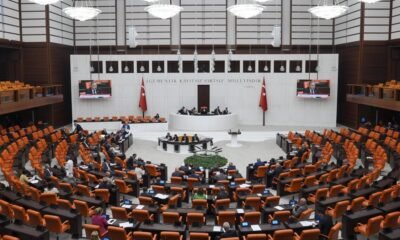
 Politics2 days ago
Politics2 days agoTurkish opposition lags amid shrinking support
-
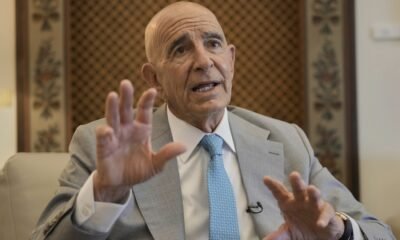
 Refugees3 days ago
Refugees3 days agoUS envoy doubles down on support for Syria’s government and criticizes Israel’s intervention
-

 Lifestyle2 days ago
Lifestyle2 days agoZindan Cave: Türkiye’s hidden gem for history, nature lovers
-

 Politics2 days ago
Politics2 days agoTürkiye battles smear campaign over its support for Palestine
-
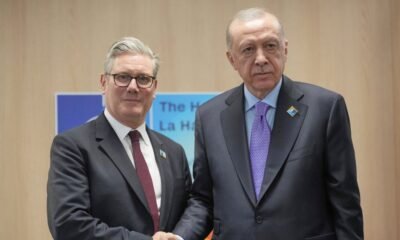
 Economy1 day ago
Economy1 day agoErdoğan, Starmer discuss Eurofighter procurement, trade deal update
-
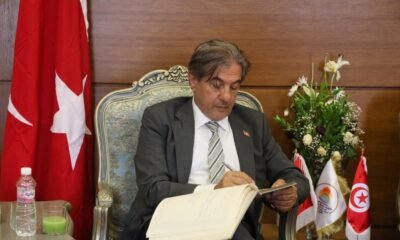
 Economy2 days ago
Economy2 days agoTurkish envoy highlights Tunisia’s role as ‘gateway’ to Africa
-
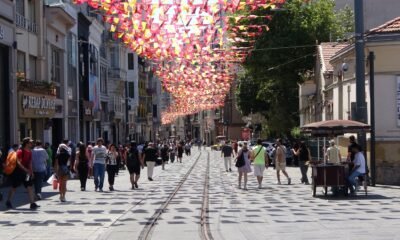
 Economy2 days ago
Economy2 days agoTürkiye inflation expectations down ahead of key rate meeting
-

 Daily Agenda2 days ago
Daily Agenda2 days agoThe fire in Sakarya jumped to Bilecik hundreds of acres of ash




